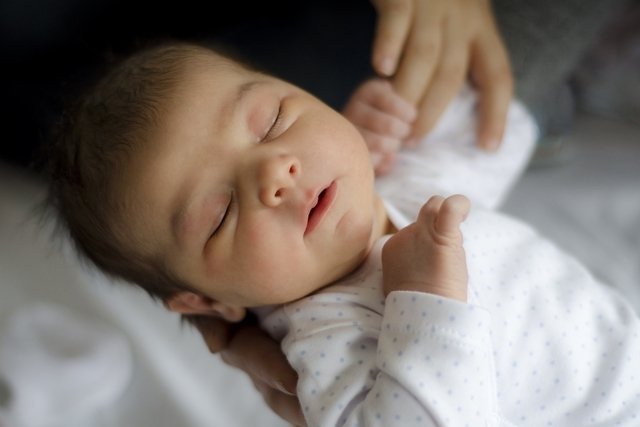Some babies may have a more restless sleep, which may happen due to the increase in stimuli during the night, becoming more awake, or as a consequence of health situations, such as colic and reflux, for example.
A newborn baby’s sleep routine, during the first month of life, is related to feeding and diaper changes. During this phase, sleep is usually calm and can last between 14 and 17 hours a day, waking up every 3 to 4 hours. However, even though the baby is sleeping for many hours, it is important that he is woken up so that he can be fed and his diaper changed.
The number of hours slept per day begins to decrease from the 4th month of life, which is when the baby begins to produce melatonin, which is the hormone responsible for regulating, being able to sleep between 12 and 15 hours per day during this period.

What can it be
Some of the main situations that lead to more restless baby sleep are:
- Many stimuli at night and few during the day;
- Cramps;
- Reflux;
- Respiratory changes;
- Parasomnia, which is a sleep disorder;
A newborn baby’s sleeping hours, in the first month of life, take up most of the day, as the baby sleeps around 14 to 17 hours a day, however, the baby can stay awake for up to 1 or 2 hours in a row and wake up every 3 or 4 hours, for example, and this can happen during the night.
A newborn baby’s sleeping time normally varies depending on what they eat. A baby who is breastfed generally wakes up every 2 to 3 hours to feed, while a baby who is bottle-fed usually wakes up every 4 hours.
How to identify your baby’s restless sleep
A baby’s restless sleep can be identified through some signs such as the baby’s difficulty sleeping, easy and constant crying and a very restless night’s sleep. In these cases, it is important that the pediatrician is consulted so that the baby can be assessed and the cause of restless sleep investigated, followed by guidance to ensure a more peaceful night’s sleep for the baby.
What to do to make your sleep restful
In order for the baby’s sleep to be less restless, it is important to adopt some strategies during the day and night to promote the baby’s rest. Therefore, it is recommended:
- Keep the house lit throughout the day and reduce light intensity at night;
- Play with the baby as much as possible during the day;
- Waking the baby during feedings, talking and singing to him;
- Do not avoid making noises, such as the phone, talking or vacuuming the house, even if the baby is sleeping during the day. However, noise should be avoided at night;
- Avoid playing with the baby at night;
- Keep the room dark at the end of the day, only turning on a night light when you feed the baby or change the diaper.
These strategies teach the baby to distinguish day from night, controlling his sleep. Furthermore, if the restless sleep is due to reflux, colic or another health situation, it is important to follow the pediatrician’s instructions, and it is important to burp the baby after feeding, or bend the baby’s knees and take them to the bed. belly putting pressure on, for example. Check out more tips on how to help your baby sleep.
See more tips from Dr. Clementina, psychologist and baby sleep specialist:
Bibliography
- VIVASAÚDE. The children’s sleep ritual. Available at: <https://www.spsp.org.br/PDF/Viva%20Sa%C3%BAde%20Ed%20198-87-88-89-90.pdf>. Accessed on October 13, 2021
- ZANDONÁ, Bianca. Sleep in infants up to 6 months of age: the influence of intra- and extra-uterine factors. Master’s thesis, 2018. Federal University of Rio Grande do Sul.

Sign up for our newsletter and stay up to date with exclusive news
that can transform your routine!
Warning: Undefined array key "title" in /home/storelat/public_html/wp-content/plugins/link-whisper-premium/templates/frontend/related-posts.php on line 12
Warning: Undefined array key "title_tag" in /home/storelat/public_html/wp-content/plugins/link-whisper-premium/templates/frontend/related-posts.php on line 13




